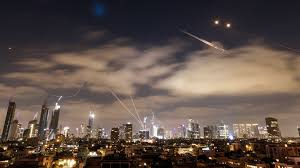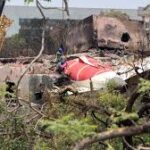The conflict between Iran and Israel intensified on Monday as Tehran launched a fresh wave of missile attacks, killing at least three people and injuring dozens more in central Israel. The strikes, part of Iran’s ongoing retaliation for Israel’s earlier attacks on its nuclear and military infrastructure, mark the fourth straight day of escalating hostilities with no sign of a ceasefire.
Iran’s Foreign Ministry confirmed it had fired approximately 100 missiles in the early morning assault, calling it a “measured response” to last week’s Israeli airstrikes that targeted Iranian military leaders and nuclear facilities. Iranian sources claim those Israeli attacks killed at least 224 people.
In response, the Israeli military carried out retaliatory air raids on multiple sites in Tehran, including command centers operated by the Quds Force — the elite external operations arm of Iran’s Islamic Revolutionary Guard Corps (IRGC).
“We clearly see that our civilians are being targeted,” said Israeli police spokesman Dean Elsdunne, speaking outside a heavily damaged apartment block in Petah Tikva, near Tel Aviv. Authorities confirmed missile impacts at four locations in central Israel, causing widespread damage to residential buildings and leaving families trapped under rubble.
Among the victims were two women and a man, all in their 70s. Israel’s emergency medical service, Magen David Adom (MDA), reported at least 74 injuries, including a critically wounded 30-year-old woman. Paramedics continued search-and-rescue operations well into the morning.
“When we arrived at the scene of the rocket strike, we saw massive destruction,” said Dr. Gal Rosen, an MDA paramedic who rescued a four-day-old baby from the wreckage of a burning building.
Iranian Foreign Minister Abbas Araghchi indicated on Sunday that Tehran would consider halting its attacks if Israel stopped its bombardments. However, Israel responded with a new round of airstrikes targeting oil refineries and government buildings in Iran. The IRGC vowed further escalation, warning, “Future responses will be more forceful, severe, precise, and destructive.”
The Israeli Defense Forces (IDF) confirmed it had struck at least 10 Quds Force command centers in Tehran as part of what it described as efforts to degrade Iran’s external military capabilities.
In Tel Aviv, residents reported intense pre-dawn explosions as Israeli air defense systems intercepted several incoming missiles. The blasts sent thick plumes of smoke into the sky, shook buildings, and prompted civilians to rush into bomb shelters.
Iran’s health authorities reported at least 1,277 people wounded since the fighting began, though it remains unclear how many were civilians versus military personnel. Independent monitoring groups, including the U.S.-based Human Rights Activists, estimate the death toll has exceeded 400, with nearly 200 civilian casualties.
Israel has defended its strikes as necessary to prevent Iran from obtaining nuclear weapons. While Tehran insists its nuclear program is purely civilian, recent uranium enrichment levels — approaching weapons-grade — have alarmed international observers. Western intelligence agencies say Iran has not actively pursued a nuclear weapon since 2003, but growing stockpiles and technological advances have revived fears of a nuclear crisis.
With tensions rapidly escalating, world powers have urged restraint, but neither side appears willing to back down, raising concerns of a wider regional war.
Nzubechukwu Eze







